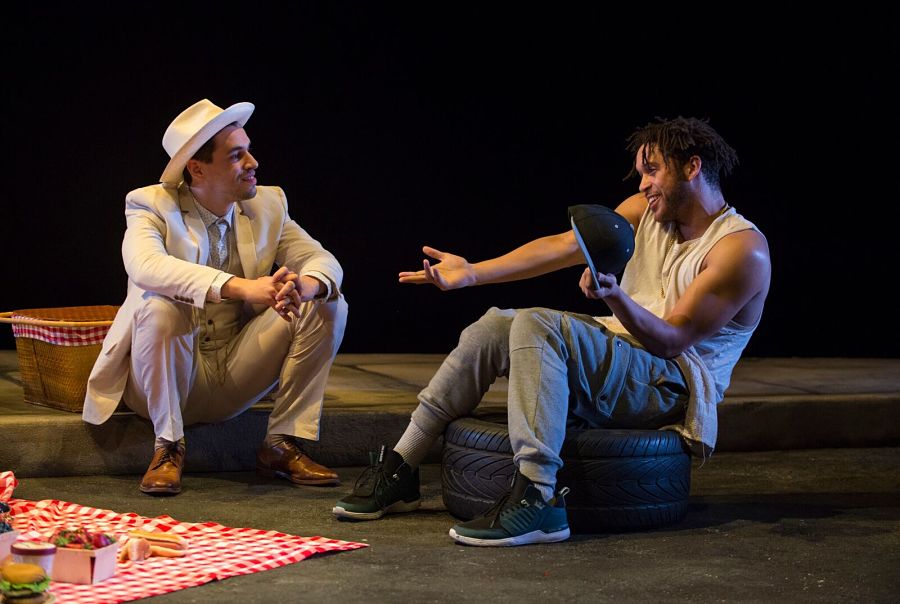At the center of a current controversy over theatre criticism in Chicago is Pass Over, a play at Steppenwolf Theatre Company through July 9 that puts a racial twist on Beckett's classic Waiting for Godot. We asked the playwright to respond to the ruckus kicked up by her work.
My play Pass Over, currently in production at Steppenwolf in Chicago, engages a majority white audience in a conversation about the violent effects of white oppression on black bodies. The embodiment of that oppression has two faces: Mister, a genteel, upper-middle-class man on his way to his mother’s house, and Ossifer, a menacing beat cop. My play argues that while Ossifer’s overt aggression is pernicious, Mister’s complacent privilege is far more lethal. That one actor plays both parts demonstrates the connection between the them: Ossifer’s menace fertilizes the soil necessary for Mister’s wide-eyed entitlement to thrive.
Pass Over is confrontational and deeply unsettling by design, so to say that I am surprised by its critical responses would be a lie. I hoped for reviews that reckoned with its themes, and expected a degree of “not all white people” side-stepping. The critical response, however, was a crash course in the myriad ways people who feel implicated by a play’s message attempt to dodge that bullet.
Two of the most egregious responses came from blogger Katy Walsh, of the Fourth Walsh, and Chicago Sun-Times theatre and dance critic Hedy Weiss. Walsh began her overwhelmingly positive review by straight-up using the n-word, even though my play addresses how offensive it is for white people to do so. (The original title of the now-amended review, “The N-Word is Nwandu,” equated the n-word with my name as well.) After being confronted by members of the Chicago theatre community, including playwright Ike Holter, Walsh amended her review and issued a mea culpa. Shortly after, she published a longer, more self-reflective apology, and has decided temporarily to step back from reviewing plays in order to “bridge divides and work toward understanding.” While the original offense still stings, Walsh’s willingness to receive feedback about the pain she inflicted is a promising turn of events.
I find it difficult to imagine Ms. Weiss—whose decades-long career is peppered with tone-deaf, misguided, and downright unethical comments—making such an adjustment. Her review faulted me for “distorting” the problem of gun violence in black communities, shifting the focus to so-called “black on black crime,” a bigoted framing that reinforces the demonization of black men.
That Weiss’s review was published a mere three days before Jeronimo Yanez was acquitted for the murder of Philando Castile is lost on no one. It is the system laid bare: the police-state’s aggression working in tandem with the fourth estate’s complacent privilege yet again. Weiss’s review perpetuates a toxic discourse in which black lives do not matter and white lives remain unburdened by the necessary work of reckoning with white privilege and the centuries-long legacy of violence by which it is secured. What’s more, Weiss overlooks that my play does in fact depict the self-inflicted violence that ravages the lives of countless black youths in Chicago and elsewhere when Moses and Kitch enter a suicide pact.

Despite the damage done by Weiss’s remarks, I am heartened by how fervently the Chicago theatre community has responded to them. Holter, Kevin Matthew Reyes, Tony Santiago, Sydney Charles, and Sasha Smith came together to form the Chicago Theater Accountability Coalition, or ChiTAC, whose mission, according to their website, is to “call attention to racism, bigotry, and hate speech in Chicago theatre criticism.” ChiTAC collected more than 3,500 signatures on a petition calling for theatres to stop extending complimentary tickets to Weiss, galvanizing the very people most at risk for being targeted by her reviews.
I am also heartened by the notes of encouragement and thanks that I’ve received on social media and in person from total strangers who have encountered my play: the two women who traveled from Washington, D.C., to see the show and who talked with me about the impact it had on them; the man who brought his pre-teen sons to see the show as a way to help them all cope with the threat of violence they have inherited as black men; the Holocaust survivor who confessed that he did not expect to relate personally to the play or its characters but found that he did.
Reconciliation is impossible without an honest conversation about who is angry at whom, and I am deeply grateful for the opportunity to present a reality that most black audience members identify with and find cathartic in a historically white institutional space. I could not have done it without the brilliance and courage of my collaborators, including Danya Taymor, Jon Hill, Julian Parker, and Ryan Hallahan, and the institutional support of Steppenwolf artistic producer Aaron Carter and artistic director Anna D. Shapiro.
I write plays that hold a mirror up to society, that expose the darkness as a means to finding light. This is necessary work. Healing work. During rehearsals, the text underwent an extensive rewrite, due in large part to the extensive rewrite our nation has undergone since last November. The work was thrilling—some of the best I’ve accomplished to date—and I am unwaveringly proud of the result.
Antoinette Nwandu is a playwright based in New York City.





